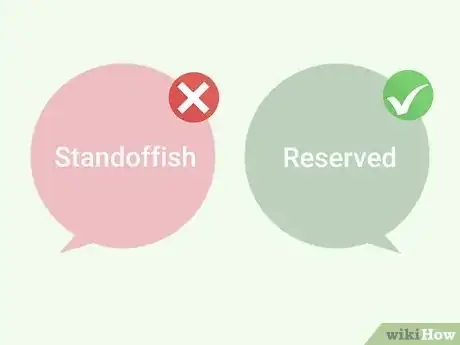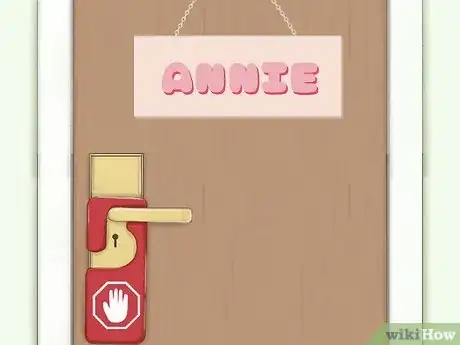This article was co-authored by Wits End Parenting. Wits End Parenting is a parent-coaching practice based in Berkeley, California specializing in strong-willed, “spirited” children with impulsivity, emotional volatility, difficulty “listening,” defiance, and aggression. Wits End Parenting's counselors incorporate positive discipline that is tailored to each child’s temperament while also providing long-term results, freeing parents from the need to continually re-invent their discipline strategies.
There are 7 references cited in this article, which can be found at the bottom of the page.
This article has been viewed 24,602 times.
Introverts are often overlooked in favor of extroverts. Many people try to encourage introverts to be more extroverted even though they are two personality types and one is not better than the other. When raising an introverted teenager, you should accept your child for who they are, respect their boundaries, and encourage their interests.
Steps
Creating a Positive Self-Image
-
1Accept your child for who they are. The most important thing you can do as you raise your introverted teen is to accept them as they are. Don’t try to make them become extroverts or get them to be more outgoing. Accept their personality for what it is. This will help them develop a better sense of self.[1]
- It is also important to validate your teen, so make sure that you tell your teen that it is normal to be introverted. For example, you might say something like, “Being an introvert is totally normal. There is nothing wrong with being an introvert.”
- According to scientific studies, extroverts and introverts have different brain chemistries, which means their brains are hardwired differently. This means they are naturally and biologically made to be an introvert.
-
2Describe your child using positive words. People may use negative or unflattering words to describe your child. You can rephrase these descriptions into something positive. This helps your child refrain from adopting negative labels and descriptions for themselves and instead create a healthy, positive image.[2]
- You should also use positive words in your own mind when thinking about your child.
- For example, if someone says your child is “standoffish,” you can say “reserved” or “careful.” If someone calls your child “timid,” you may say “quiet” or “contemplating.”
Advertisement -
3Teach your teen their voice matters. Many times, introverted teens don’t feel like they have a voice or the ability to speak up. This means they may let people bully them or run over them. They also may not speak their mind when they do have an opinion. Teach your teen that their voice is important.[3]
- If your teen is being bullied, help them learn how to speak to a trusted adult or to address the issue. You and your child may be able to come up with a phrase that can work, like, “Stop treating me this way” or “Do not speak to me like that.”
- When your child speaks, listen to them. Ask questions and encourage them to talk to you. Make sure they know that you value their opinions and ideas.
- Teaching your child to be more assertive may also help.
-
4Help your teen express feelings. Introverted teens may have trouble expressing their feelings or talking about what they are thinking. Because they focus on their inner self and keep things internalized, they may have trouble figuring out how to communicate their feelings. Help your child learn how to express their feelings.
- Create an environment where they feel comfortable sharing their feelings. Don’t make them feel embarrassed or wrong for their feelings.
- If your teen doesn’t want to share feelings or ideas verbally with you, try getting them to express themselves in other ways. Get them to write in a journal, create art, or play music to express their feelings. You may also encourage individual sports, like boxing or martial arts, to help them release frustration.
Nurturing Your Child’s Personality
-
1Encourage your teen’s interests. Your introverted teen may have a lot of different interests, but these interests may not be what other children like. Your teen may not be interested in teen sports or school clubs. Talk to your teen about what they are passionate about and help them pursue those interests.[4]
- For example, your child may be interested in writing or painting, so you may be able to find writing or painting classes in your community. If your child is interested in science or computers, consider science and computer camps.
-
2Respect your teen’s space. Introverts need privacy and space. They often spend a lot of time in their bedrooms with the door closed. While you may be suspicious or worried that your child is spending so much time alone, understand that introverts need that space and privacy.
- Introverts need time away from everyone else. They enjoy being alone and in quiet environments. They like solitary activities, like reading or writing. Respect your child when they demonstrate they need their space.
-
3Provide your teen with alone time. Introverted teens needs time to be alone to regroup and center themselves. If they don’t have this time, they may get upset or feel out of sorts. Your teen needs time every day to be by themselves.[5]
- This may be 15 to 30 minutes of time in their room where they can process the day’s events.
- Don’t get mad or think they are being antisocial if they spend time alone every day after dinner or even on weekends.
-
4Understand introversion. One important thing to do as you raise your introverted teen is to understand what being introverted means. Introverted people may enjoy alone time, not share their feelings easily, and prefer small groups to large crowds. Your teen may have a few good friends and it may take them awhile to open up to people.[6]
- Introverts may be chatty with family members or people they have a connection to, but may not talk to strangers. They may listen more than talk when they are with others.
- They prefer solitary activities, like reading, writing, or drawing. They often watch activities before they join.[7]
- Introversion is not being shy. Shy implies there is a bit of social anxiety in the person causing them to feel uncomfortable in a social situation.
Encouraging Your Child to Make Connections
-
1Help your child find other introverts. Just because your child is an introvert doesn’t mean they don’t want to have friends or socialize. They will probably do better becoming friends with other introverts than extroverts. Take your teen to places where they might meet other introverts, like library teen events, teen book clubs, or board game cafes.[8]
- If your child has introverted friends already, make your home a safe space for them to interact without expecting them to be extroverted or going out of their comfort zone.
- Ask your teen’s teachers or other parents if they know any introverted students who may be similar to your child.
-
2Encourage new experiences. You should help your teen try new experiences even though they may be nervous. Do this slowly and gradually. Don’t force them to go somewhere they don’t want to, but also don’t let them miss all new experiences. Gently encourage them to do things, like go to a birthday party they were invited to. However, respect their limits if they refuse to do certain things.[9]
- If your child is resistant to trying new things, talk to them about it. Tell them, “The way you feel about things is normal. However, you should try some new experiences. There’s nothing to worry about when you try something new. You may discover you like something you didn’t know you liked. If you don’t like it, then that’s okay. At least you tried.”
- Reinforce the positive outcomes when your child takes a chance. For example, if your child goes to a party, say, “Even though you were hesitant, you went to the party and had a great time. You even made new friends.”
- Give positive reinforcement when your child goes outside of their comfort zone and tries something. Say, “I’m proud that you tried that new activity. I know that was difficult for you.”[10]
-
3Avoid forcing your teen to do things they don’t want to. Many people try to force introverted kids to be extroverted. Introverts are sometimes passed over because they’re not as outgoing, or they are told they are wrong for being introverted. This leads to people trying to force them to socialize more, be more outgoing, and go out of their comfort zone. Try to avoid doing this with your child.[11]
- Realize that your child has their own unique personality. Not everyone needs to be outgoing to be happy or fulfilled. Don’t make you teen do things they are uncomfortable with or act in ways they don’t want to.
-
4Use technology to communicate. For an introvert, talking or interacting in person may be overwhelming or difficult. Many introverts pull away from crowds or others, or choose their words carefully and have trouble getting out their ideas verbally. Try using technology to communicate with your teen.
- Texting is a great way to talk to your teenager. Your teen may open up more if you text, “How was your day?” than if you ask them in person.
- Introverts may not feel comfortable calling their friends on the phone, but they can text and e-mail to keep in touch and communicate.
-
5Allow your teen to prepare for new situations. Your introverted teen may feel overwhelmed when approaching new situations. You should allow them to get used to the idea of a new situation at first. You can do this by letting them arrive somewhere early so they get used to the area or discussing the situation and experience beforehand.[12]
- Your teen may feel more comfortable arriving at a party early so they can get there before too many people are there and get used to the environment.
- Your teen may want to go to a new place and observe everything before joining in or entering. This helps them process.
- You may let your teen go to the school before the school year to check out where their classes are, the route they will have to take, and how close it is to their locker.
Expert Q&A
-
QuestionHow do you parent an introverted teenager?
 Wits End ParentingWits End Parenting is a parent-coaching practice based in Berkeley, California specializing in strong-willed, “spirited” children with impulsivity, emotional volatility, difficulty “listening,” defiance, and aggression. Wits End Parenting's counselors incorporate positive discipline that is tailored to each child’s temperament while also providing long-term results, freeing parents from the need to continually re-invent their discipline strategies.
Wits End ParentingWits End Parenting is a parent-coaching practice based in Berkeley, California specializing in strong-willed, “spirited” children with impulsivity, emotional volatility, difficulty “listening,” defiance, and aggression. Wits End Parenting's counselors incorporate positive discipline that is tailored to each child’s temperament while also providing long-term results, freeing parents from the need to continually re-invent their discipline strategies.
Parenting Specialists Accept them for who they are. Introversion is an excellent trait—they typically are very skilled problem-solvers, for instance. Being an extrovert isn't 'better,' so don't try to change your child. Talk in terms of preferences, rather than defects. For instance, don't say, "She's feeling shy." Instead, you might say, "She likes to know people a little more before she talks about them." Talk to them one-on-one. Sit down with them each day at a quiet time, like right before bed, and give them a chance to talk. An introverted teenager might not share their thoughts at the dinner table or in a group setting, but these kids are very thoughtful and they have a rich inner life.
Accept them for who they are. Introversion is an excellent trait—they typically are very skilled problem-solvers, for instance. Being an extrovert isn't 'better,' so don't try to change your child. Talk in terms of preferences, rather than defects. For instance, don't say, "She's feeling shy." Instead, you might say, "She likes to know people a little more before she talks about them." Talk to them one-on-one. Sit down with them each day at a quiet time, like right before bed, and give them a chance to talk. An introverted teenager might not share their thoughts at the dinner table or in a group setting, but these kids are very thoughtful and they have a rich inner life.
References
- ↑ https://www.verywell.com/how-to-raise-an-introverted-child-1449064
- ↑ http://aspeneducation.crchealth.com/article-introverted-teens/
- ↑ http://www.quietrev.com/15-ways-to-parent/
- ↑ https://powerofmoms.com/5-tips-for-extroverts-raising-introverts/
- ↑ http://www.parents.com/kids/development/shy/raising-an-introvert/
- ↑ https://www.verywell.com/how-to-raise-an-introverted-child-1449064
- ↑ https://www.verywell.com/traits-of-introverts-1449351
- ↑ http://aspeneducation.crchealth.com/article-introverted-teens/
- ↑ http://www.workingmother.com/content/6-tips-raising-introverted-child









































































